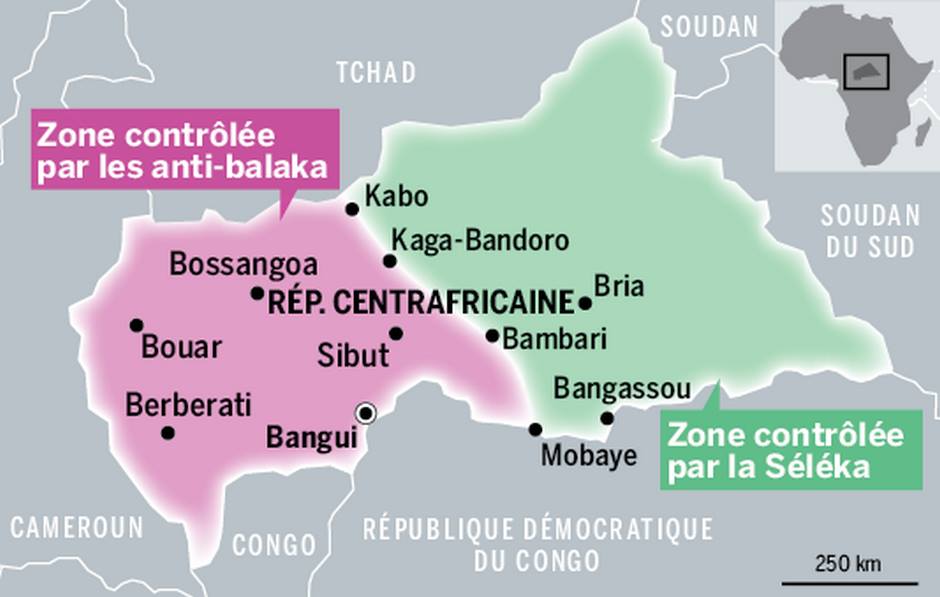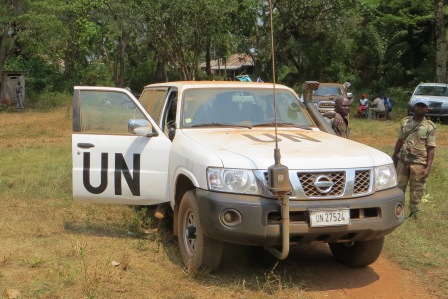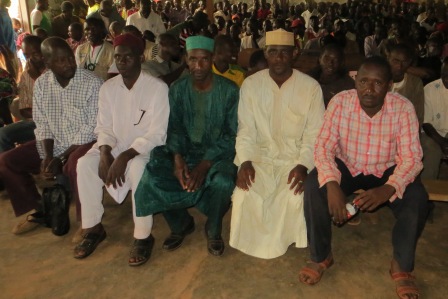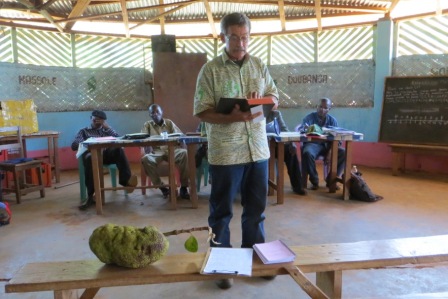While there are maps being circulated showing the proposed division of the country of Central African Republic into 2 separate entities, the president of C.A.R. has sent out her cabinet ministers with UN reps to start up reconciliation initiatives in all the major towns.
We got back from a trip to Yaounde just in time for Roy to participate in the meeting in our town. In brief, there were Muslixms in attendance, having been escorted from the border, but they weren’t familiar faces from Gamboula.
The gathering was divided into groups (M’s, militia, pastors, development workers, women, men, etc.) and they were given questions to consider and report back to the entire gathering. It was all peacefully under control. There were some heavy sharing and hot feelings, but the huge crowd was respectful. Roy was given the opportunity to speak at the end.
If you have the time and want to read about our local meeting in detail, here’s Roy’s report:
Greetings everyone!
I must take time to report to you an amazing event that took place at Gamboula – UN personnel came with a cabinet minister from Bangui and other staff to lead a reconciliation meeting and invited anyone and everyone from the Gamboula region to attend. There must have been over 500 people there including most of the heads of all areas of life at Gamboula. Wane represented the hospital and I represented CEFA and the missionaries. This is an initiative being put into action by the interim President Catherine Samba-Panza and is taking place at all sous-prefectures all over the country – they had just come from Sosso-Nakombo and Dede, then headed to Amadagaza to finish up. I will give an account of what happened then offer my comments:
REPORT: We were told to arrive early at the community center known as Oxygen 2. Unfortunately, we were delayed over 2 hours waiting for 12 Fulani/Muxlim friends to arrive that were delayed at the border, but they finally came. We got started around 9:30am. The cabinet minister acted as moderator and said we could use whatever language we wanted, but it was mostly done in Sango! He explained the purpose of the meeting was to hear people out, allow them to express their feelings and opinions, then work together on a reconciliation process. The whole lot of people was divided up into sectors – just to name a few: religious, NGOs, women, local government, youth, merchants, Muxlims, and what they called “armee” which they explained were the Anti-Bal-ka and Sel-ka – there were many ABs present, but no S. We were told to all go outside and meet together to discuss our platform of how the past two years has affected each group and their reflections on the whole situation. We probably spent 25 minutes discussing, then we regrouped inside and began to hear people out. Each group’s spokesman told of the horrors that took place during the Sel-ka reign, during the AB reign, and during the African Unity troops’ presence up until now. Then they put a set of 5 categories up on a board with several questions underneath.
1) Children and Conflict – What happened to children and how were they affected and how can we integrate ones that took up arms back into society?
2) Disarming and Security – Should just the militia/Selka etc. be disarmed or should the whole population? How can we insure proper security in the future?
3) Truth, Justice, Repairs, Reconciliation – Is reconciliation possible and if so, what are the steps to achieve it? Is forgiveness of those who participated in the violence necessary in order to obtain peace?
4) Good government – How can we change the political system so that there is more participation by the local population? How can there be better assistance to help local authorities do their jobs better? How can it be made so that there is transparency with the governing bodies?
5) Restoration of the local state government authorities – What is the role of the local governing bodies and what is the role of the local citizenry to assure that this happens?
We all took additional time to discuss each of these, but only got through topic 3 by 5pm, so we adjourned and came back the next day. Unfortunately, the head official of Kentzou blocked the return of the Muxlims (we’re not clear why) so they were not present to participate the second day.
After all the responses to all the questions were heard, then each group was told to go out and chose a representative to go to Bangui at a later date for an all-country forum. Chosen were reps for men, women, youth, minorities, and “armee” meaning ABs or Ss. Of note, Pastor David Koursou of the EEB was unanimous selection for the men. Though none of the Fulani showed up, the group chose one of their spokesmen to go to make sure they were represented (jokingly they said I was a minority and could represent them all, but I graciously declined!).
Then I asked permission to say a few words on behalf of the missionaries – they say I originally asked for 5 minutes but then I spoke for 30! I thought it was only 10-15!
At the end, they said that all of the responses would be collected from around the country, then summarized and expressed at a later forum in Bangui. They then asked me to do the closing prayer.
COMMENTS:
1) I felt the whole thing was well organized and it all went well – dividing it up into groups to have one spokesperson saved a lot of time. Those that spoke had firmness in their deliveries, but not hatred or anger. They were sincere about their answers. To succeed at such a meeting is nothing short of a miracle – with excellent questions and people responding in a civilized manner.
2) It was very discouraging to everyone that the Cameroonian authorities would intervene like that and try to destroy a UN supported peace process. But, the CAR-Cameroon relationship s is a serious issue right now, including CAR merchants boycotting any purchases in Kentzou anymore due to much higher custom charges put in place at the border.
3) Every group talked about how they were harmed by what took place. Some in gory detail, like the ABs. But the fact of the matter is – there is still suffering going on – the Fulani or Muxlims in camps (its been a year already since they fled CAR) and there is still village burning happening up north of Godawa.
4) The conclusion as to why there has been so much violence was the fact that there is a lack of security – the local authorities could not handle rebel takeovers nor can they handle the rogue groups (ex-Seleka) that continue to wreak havoc up north. The immediate solution for this is for UN troops to quit delaying in getting here and spread them out not just at Gamboula, but Godawa and Amadagaza. They said, though it is embarrassing to have outside troops come in, when the MINISCA do arrive, they must deal with the violence that is still happening before reconciliation can be effective. Outside help to keep the peace is a must for reconstruction to take place to eliminate fear and allow relief agencies to function.
5) Each group firmly said we must end the violence, we must seek peace, and we must seek reconciliation between all the groups here. The pastoral group said right off that this is not a religious war between Muxlims and Xns because the ABs are not Xn! The Fulani said this is not a religious war because it is a struggle for political power. Thus, it is concluded that all of this violence is due to a rebellious few that have taken up evil ways to kill people and destroy villages and property in order to gain power. All groups said we are all central Africans and we need to put the past behind us, forgive one another, and rebuild the country. Some even clarified the forgiveness as sincere forgiveness, we don’t want any hypocrites.
6) Weapons: Though the disarmament question was split, basically it was said that those with weapons and military and/or evil intentions need to be disarmed. It was practically unanimous that the FAKAT or Central African special army be sent to all sous-prefectures in a force strong enough to keep the peace, thus to allow UN troops to go home. Hunters can keep their rifles (as long as they have papers says the local authority).
7) Restitution – The transparency issue was big as well – for honesty to reign and corruption to die. Also, the Fulani asked the possibility that their homes and shops be repaired somehow. The ABs asked that they somehow get some help for all they have done to maintain security. The women’s rep asked the national government to make them an NGO and the moderator responded to say that the women must form their own NGO then ask for projects from the government.
8) My message: I felt it was important that the participants heard from a missionary perspective so I presented the following:
– that we are people too, part of the community, involved in work and play, sharing in joys and sharing in the sufferings that have taken place and continue to happen. Living in fear and having to be uprooted twice as refugees is not a pleasant experience by any means, but by God’s grace we have been able to return and be involved in the healing of the country.
– that we have come to be involved in the transformation of lives, both spiritually and physically, not forcing anything on anyone, but gently bringing about changes in love. Whether it is through the work of the Bible school, the hospital, or CEFA, our hearts are geared towards helping anyone, not just one racial group.
– I used Aleta and I as examples that we have spent 37 years as missionaries in Africa and that our children were born here, not in America, so I emphasized that though we are not citizens of this nation, and technically are not supposed to get involved politically, we want to be part of the process in helping CAR heal and move forward.
– Then I said, after hearing how so many voices have used God as the supreme being and claim his principles as being those we should live by, I too wanted to say that the ultimate solution to all the issues here of bringing peace has to be one of the heart – where our hearts have been bad, we need to confess our sins, then forgive one another in order for reconciliation to truly take place. I said that Jesus has told us to simply love God with all our hearts, souls,minds, and bodies and then do the same with our neighbors. Hatred, destruction, and killing have no place in the hearts of those who love Him.
– I read two Scriptures, Eph 2:13-17 and said this is where true peace comes from, then I read 2 Cor 5:17-21 and turned to the church leaders and said this is our responsibility as church leaders to bring the flock back to studying his Word and applying it to our lives and I held up the booklets I printed in French (I am still translating into Sango) “Discipleship Encounters” on training church members to be disciples for Christ and gave copies to the pastors and offered my help in setting up a program for it in each denomination.
– I also held up a jackfruit and said when we have hunger problems what do we do? We seek food, but do we go and steal it from someone else’s garden or do we wait for development agencies to give it to us? No, we raise it in our own gardens. I asked what do we do with the seed then? The women answered right away – plant it! I asked why and they said because it tastes good, it is nutritious, and we want more. I said that is true but it is also true that with that one seed a tree can produce a lot more so that your neighbors can benefit from it too. Then I said God’s Word is also like that seed, it produces tasty and nutritious food for the spirit (or heart) that we need to devour and share with others. Let’s go with what is good and right.
– I then turned to the minister and said we, all of us here from the Gamboula region, appreciate the fact that he and his team came all the way to Gamboula to help us in this peace process. I said we get very little attention from the national government because we are not significant enough or we are too far away, but I said we are a border town and we have health and security issues that need government help – CEFA and the hospital cannot do everything to help the local authorities nor can we solve all the people’s problems, but we want to be part of the help here. I turned to all of them saying we all need to participate in first returning to God’s principles then volunteering to help Gamboula and CAR’s future be a secure one and healthy one. I also said CEFA would help the women to organize themselves and create their own NGO. (after writing all this maybe I did take 30 mins!).
Well, I thought you would be interested in what is happening here and have it for your records if not to have something very positive to be praying about. If you want more detail, let me know.
Blessings,
Roy






